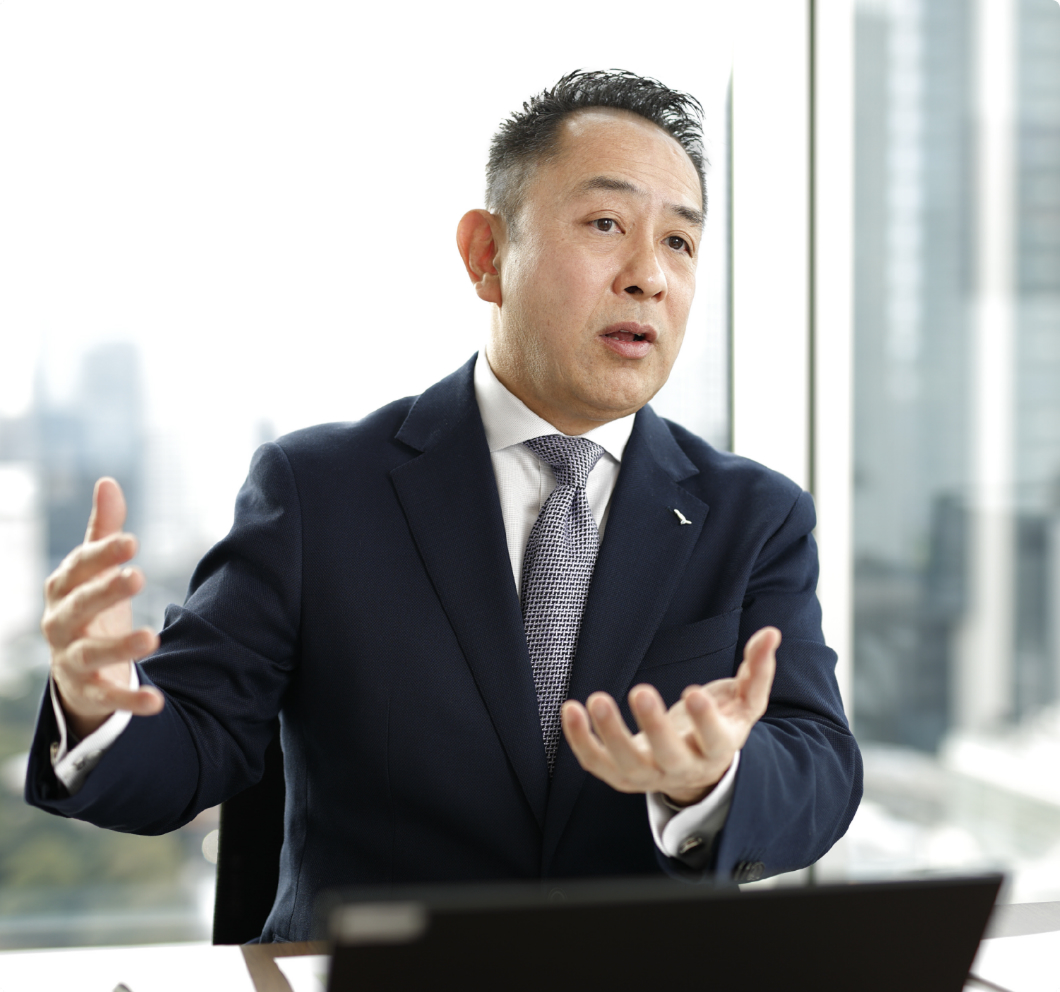Greetings from the President
- TOP
- Sustainability
- Greetings from the President

From the food industry to the construction sector, and
subsequently into a broader range of industries
Achieving deep integration with
the Data to Data (DtoD) system,
while contributing to environmental initiatives and
promoting the sustainability of society.
Ken Nakajima, President and CEO
Thank you very much for your continued support of the Company. I am Ken Nakajima, President and CEO. Three
years have passed since I took office in January 2022. I spent five formative years of my childhood in the
great outdoors of South Africa, where my father was stationed, and later developed strong self-discipline as a
university student, playing rugby at the collegiate athletic level. I take great pride in the fact that these
experiences have shaped my adventurous spirit, enhanced my English language proficiency, and strengthened my
ability to overcome challenges.
After joining Sanwa Bank (now MUFG Bank) as a new graduate, I had the opportunity to meet the late founder of Infomart,
Katsuteru Murakami, in 2000 while in charge of partnership operations with IT venture companies. I joined the Company
in 2010, drawn by Mr. Murakami's philosophy of 'making a real difference in the world' and his innovative business
model. After joining the Company, while promoting the development of HR systems and the improvement of corporate
sales, I took on the role of executive in charge and was involved in the launch and expansion of the ASP billing
system (now, "BtoB Platform Billing"). Since then, I have been dedicated to Japan's digital transformation (DX).
Infomart's business is inherently aligned with sustainability
Our business is built on the DtoD (Data to Data*1) system, which directly supports CO2
reduction efforts by converting large volumes of paper invoices, contracts, purchase orders, and other documents
into digital data. Most common electronic invoice systems operate on the AtoD (Analog to Data*2)
model, which allows for integration even when business partners still rely on analog data. While this presents
a low barrier to entry, it also limits the broader paperless transition of Japanese society, offering only a
partial solution.
Our goal is for the adoption of the DtoD system to enable both ordering and receiving companies to reduce costs,
leverage data, and simultaneously ease the workload of users while lowering the environmental impact. As a result,
the development and sustainability of Japanese society will be strengthened - this is the unique value we are poised
to provide.
In 2023, to mark the Company’s 25th anniversary, we refreshed our corporate logo, tagline, and website, and in
January 2025, we launched a brand movie. The movie is designed to showcase our history and vision through animation,
while also conveying to a broader audience the type of social contributions we strive to make.
-
*1
Data to Data: A system for exchanging digital data between companies, such as orders, invoices, and quotations.
-
*2
Analog to Data: Sending of documents via email or cloud tools. Emails and PDFs received are digitalized using AIOCR and stored electronically.
Progress of Mid-term Management Plan, and our new vision
The Mid-term Management Plan introduced at the time of his appointment as president sets a target of 20
billion yen in net sales and 5 billion yen in operating income by 2026. Performance figures for 2024 are on
track, with results surpassing the initial plan.
In the Food business, particularly, the market expanded significantly beyond the traditional food and beverage
sector to include the wholesale industry, where digitization had previously lagged, contributing to strong results.
On the other hand, in the ES business, the response to the special demand triggered by the introduction of the
invoice system was greater than anticipated, resulting in slightly lower-than-expected performance. However, the
business continued to grow steadily at the same pace as the period prior to this special demand.
The forecast for the fiscal year ending December 31, 2025, is net sales of 19.4 billion yen and operating income
of 2.3 billion yen, and we are currently on track to meet our net sales and operating income targets for 2026.
We will continue to leverage social changes post-COVID as a tailwind to implement a more aggressive growth strategy.
DX in receiving and placing construction orders is revitalizing the entire industry
As part of this aggressive strategy, we have identified three key priorities for 2024. The first priority is
the ‘promotion of industry-wide DtoD strategies.‘ We aim to expand our system for receiving and placing orders
beyond the food industry and, in the future, replicate the success of the Food business across as many
industries as possible.
We believe the Company is now entering its third phase of development. Phase 1 (1998-2014): The start-up period.
We have developed a BtoB platform specialized for the food industry, which has been adopted by some 4,100 buyer
companies and 46,000 seller companies by the end of 2024. Transaction volume has surpassed 2.5 trillion yen, securing
the No. 1 market share in Japan's food industry. Phase 2 (2015-): Launch of electronic invoice service for all
industries. Some 1.14 million companies have adopted the system as of the end of 2024. Phase 3 (2022-): Establishment
of new industry standards for receiving and placing orders, with a broader expansion into industries beyond the
food sector. As of 2024, the Company has fully integrated DX in the receiving and placing of orders within the
construction industry, driving the digitalization of the entire sector. We will intensify our efforts to establish
industry standards within the construction sector and expand into additional industries.
The municipal business also expanded through the strengthening of regional bases
The second priority is to ‘strengthen regional bases.’ In 2024, we opened new offices in Sapporo, Nagoya, and
Okinawa. In addition to acquiring new customers, we will enhance our support for existing medium-sized and
large regional companies to drive further expansion of implementation.
The Company also places a strong emphasis on digital government solutions for municipalities. Although implementing
a system for a municipality is both costly and time-consuming, the outcome has been the establishment of a dominant
market share, where we are the sole provider. We view the introduction of this service to local governments not
only as a means to increase revenue, but also as a key strategy for building trust within the local community.
Pricing revisions help drive sales
The third priority revolves around ‘BtoB platform revisions.’ The Company's priority has been to reduce costs and offer competitive prices, and a review of the pricing structure has been carried out to ensure it is appropriate. This has been a significant positive driver for sales.
Efforts to curtail negative environmental impacts
As a company whose operations are closely tied to CO2 reduction, our commitment to sustainability remains
a top priority. In terms of information disclosure in line with TCFD recommendations, the latest data from 2023
shows that our supply chain emits approximately 11,000 tons of greenhouse gases under Scope 3. Seventy to eighty
percent of this is primarily due to server operations for processing large amounts of data. This estimate predicts
a reduction in emissions to 7,000 tons by 2025, as we transition from an on-premise data center ownership model
to the cloud.
Conversely, CO2 emissions reduced by our system exceeded 5,000 tons in 2024. This is due to the increasing
adoption of the ‘BtoB platform.’ The paperless use of purchase orders, invoices, contracts, and other documents
through the BtoB platform will continue, and in the coming years, the reduction in CO2 emissions will
surpass the emissions generated.
Strategic investment in human capital to build a self-sustaining organization with a 100-year operational horizon

With regard to human capital initiatives, as in the previous year, we have continued our focus on enhancing
diversity and increasing the proportion of female employees. Additionally, there was a further rise in the
utilization rate of maternity and paternity leave. In FY2024, the utilization rate for women was 100%, and
for men was 72.2%.
The head of the Human Resources Department was appointed in January 2025. He is an individual with strong practical
skills who aligns our philosophy of management focused on ‘Winning with People.’ As we approach our 30th anniversary,
it is crucial to sustain a robust business model and establish a system that nurtures a diverse pool of talent
capable of continuously enhancing it to ensure our longevity as a company capable of thriving for 100 years.
We believe that a key aspect of this transformation lies in reshaping the 'sense of reward' derived from our
work.
Individuals who recognize that their rewards extend beyond salary - embracing both 'worthwhile' experiences,
such as a sense of growth and accomplishment, and ‘job satisfaction,‘ including a sense of societal contribution
and the significance of their work - will naturally seek out work that benefits the world and actively pursue
it on their own. Moving forward, we will place even greater emphasis on mental health management and other related
areas, while reinforcing our department to better support the development of such human resources.
Approaches to issues in Japanese society
As for the current situation in Japan, we believe that sustainability and DX are not effectively integrated, and that environmental initiatives, such as the transition to a paperless office, are not progressing significantly within small and medium-sized enterprises. DX in Japan has seen significant progress, largely driven by the shift to remote work during the COVID-19 pandemic. However, many systems adopted by large companies remain on-premise and come with substantial cost burdens, keeping the benefits of DX out of reach for small and medium-sized enterprises. Our DtoD method, which leverages the cloud, offers a solution to address the cost challenges associated with digital transformation. In terms of integrating sustainability with DX, we currently display the total CO2 emissions reductions across our entire supply chain on our website. However, we plan to develop a system that will enhance motivation by showcasing this data for each individual company, making it more visible and accessible.
Challenges to business development and future prospects
Future challenges include optimizing knowledge management and accelerating development speed. With regard to
knowledge management, the challenge lies in formalizing the methods developed within the food industry and
adapting them for widespread application across other industries. For example, there is an urgent need to
establish a mechanism to broaden our industry knowledge beyond the food sector. This could involve providing
opportunities for information exchange and collaboration among companies that have adopted our products and
services, and leveraging the accumulated know-how from each company to benefit others in the same network. We
believe that this initiative goes beyond merely improving operational efficiency and will contribute to the
overall revitalization of Japan.
As to the speed of development, we are already in the process of transformation. Where waterfall development once
required significant time for even minor modifications, we have transitioned to agile development, a method that
enables detailed adjustments and development for each function. Once this transformation is complete, the speed
of development will increase significantly, enabling a more precise and responsive approach.
Message to Stakeholders
Our business model, focused on expanding the adoption of DtoD systems, is grounded in the principle of ‘making
Japanese society better.‘ Even today, with over 1.15 million companies having adopted the system and annual
commercial transactions surpassing 60 trillion yen, the demand for commercial distribution DX continues to
grow.
Looking ahead, we will remain committed to maximizing corporate value. We sincerely request the continued support
and encouragement of all our stakeholders.
